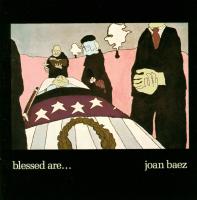Way back in 1971, Joan Baez released a double album called “Blessed Are”, which, in retrospect, may be one of the weirdest album releases of all time.

Joan Baez, in case you don’t remember or weren’t born yet, was a famous folk singer who became a prominent anti-war, anti-racism protest leader during the 1960’s, and an interpreter of Bob Dylan’s songs. As a result, unsurprisingly, she pissed off a lot of patriotic war-loving Americans who regarded her, along with Jane Fonda, as treasonous dupes of the radical left. They may not have liked John Lennon; they may have regarded Dylan with hostile indifference; they may have ignored Pete Seeger; but they hated Baez and Fonda with a toxic rage.
“Blessed Are” appears to be a peace offering of some kind, to southerners, patriots, farmers, and, perhaps, country music fans. It featured a hit for Baez, “The Night They Drove old Dixie Down”, by Robbie Robertson of The Band (and subject of a bitter dispute between him and The Band’s drummer Levon Helm).
Levon Helm says in his autobiography:
“I remember taking him [Robertson] to the library so he could research the history and geography of the era and make General Robert E. Lee come out with all due respect.”
Helm was so bitterly annoyed by Baez’s version of “The Night They Drove old Dixie Down” that he refused afterwards to sing it in concert. I wonder if he was more annoyed by her politics than anything else. What musician gets upset when another artist makes a signature song more popular?
Anyway, to make General Lee come out with “all due respect”– all the respect due to a slave-owning General who led the war effort to preserve the institution of slavery– may strike some as a dubious cause.
Look at the lyrics:
Like my father before me, I’m a working man
I’m like my brother before me, I took a rebel stand
Well, he was just eighteen, proud and brave
When a Yankee laid him in his grave
I swear by the blood below my feet,
You can’t raise a Cain back up with it’s in defeat
Some claim that the song is sympathetic to the Lost Cause ideology and defends slavery. I think it does neither. The fact that it was written by a Canadian should clue listeners in: this is an observational song, not propaganda for either side. In fact, its observational qualities are acute and beautiful and tragic.
The album also has a song by Jagger and Richards, a paean to the “hard-working” average joe who always gets the short end of the stick. And a tribute to a southern farmer friend with “the slowest drawl I’d ever heard” showing the narrator and friend around his beautiful farm. There’s an intriguing song about apocalypse: Three Horses.
But let’s move on to “Lincoln Freed Me Today”. If “The Night They Drove Old Dixie Down” seems ambiguous, “Lincoln Freed Me Today” is decidedly revisionist.
Been a slave most all my life
So’s my kids and so’s my wife
I been working on the Colonel’s farm
Aint been mistreated, aint done no harm…
The Colonel’s been right good to me
He’s taken care of my familyThe Colonel rode his buggy in from town
Hitched his horse and called us all around
Said he couldn’t keep us here no more
I saw a tear as he walked toward the door
Wow!
I’m sure Baez did not have in mind the idea of rescuing slavery from the dustbin of history, or, giving us the positive side of antebellum culture. I’m sure she thought, well, it’s a true picture of some slave-owners, and some slaves. And one must be fair by presenting both sides of the issue. But the “I saw a tear” is kind of repulsive. That’s the image we’re supposed to take away from this kindly old slaveholder?
You see how convoluted we become.
The songwriter is variously credited as David Paton, David Patten, and David Paton. It’s likely David Patton. There’s very little information out there about him.
Ian and Sylvia do a just peachy version of this song.
